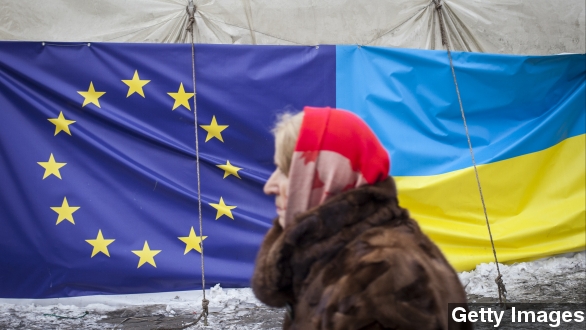While Ukrainian President Petro Poroshenko appealed to the European Union for assistance Saturday, Russian President Vladimir Putin remained defiant in the face of NATO.
Speaking at a youth camp Friday, Putin warned the West not to mess with Russia because, for one, it is a nuclear power.
"They should always realize that they are better off not messing with us. ... Would like to remind you that Russia is one of the biggest nuclear powers."
Ukrainian President Poroshenko had a different kind of warning Saturday when he spoke before a special EU meeting:
"Thousands of the foreign troops and hundreds of the foreign tanks now on the territory of Ukraine with a very high risk … for the whole peace and stability of Europe."
European Commission President Jose Barroso says, despite the situation's bleak outlook, a political solution can still be reached.
"We are in a very serious, I would say, dramatic situation. We may see a situation where we reach the point of no return."
Barroso says that the EU is prepared to level a new round of sanctions against Russia following the NATO announcement that Russia has at least 1,000 troops supporting pro-Russian separatists in Eastern Ukraine.
As Bloomberg notes, new sanctions could include more financial bans for specific Russian companies, further debt financing restrictions, or including current military contracts in the arms embargo issued earlier in July.
As for Russia's reaction to claims that Moscow is escalating the Ukrainian crisis? The Financial Times quotes Russia's ambassador to the EU as saying, "[They are] aiming to remind European and North American countries of the mythical 'Russian threat' and provoke them to take 'strong actions' against Russia."
This would be the second time in recent months that the EU has issued sanctions on Russia for its role in the Ukrainian conflict — but do they work?
Euronews reported earlier in August that Hungary, Slovakia and Czech Republic leaders have all criticized the sanctions, with Hungary's Prime Minister saying that the West was "shooting [itself] in the foot."
And a 2008 study by The Peterson Institute for International Economics found that out of more than 200 sanctions examined, only 34 percent were at least partially successful in their desired outcome.
But that's not to say they haven't had an effect on the Russian economy — they have. A senior economist at ING told The New Yorker that "it's obvious that Russia will suffer more than Europe."
Though Finland's Ministry of Finance released an assessment of the economic effects of EU's sanctions on Russia concluding that "their impact of the overall economic activity of Russia and its trading partners will be minor."
While it seems that the sanctions are making some waves economically, so far it doesn't seem like they're doing much toward motivating Moscow to change its course in Ukraine.
More recently, a source told CNN that the number of Russian troops in Ukraine far exceeds the 1,000 figure from NATO, estimating somewhere between four and five thousand.


